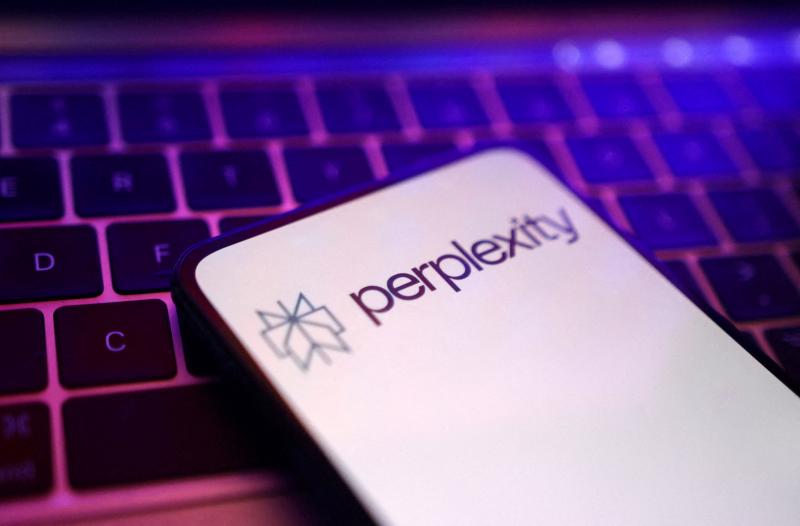Perplexity AI Inc yesterday offered Google US$34.5 billion for its popular Chrome web browser, which the Internet giant could potentially be forced to sell as part of antitrust proceedings.
The whopping sum proposed in a letter of intent by Perplexity is nearly double the value of the start-up, which was reportedly US$18 billion in a recent funding round.
"This proposal is designed to satisfy an antitrust remedy in the highest public interest by placing Chrome with a capable, independent operator focused on continuity, openness, and consumer protection," Perplexity chief executive Aravind Srinivas said in the letter, a copy of which was seen by AFP.

Photo: Reuters
Google is awaiting US District Court Judge Amit Mehta's ruling on what "remedies" to impose, following a landmark decision last year that said the tech titan maintained an illegal monopoly in online search.
US government attorneys have called for Google to divest itself of the Chrome browser, contending that artificial intelligence (AI) is poised to ramp up the tech giant's dominance as the go-to window into the Internet.
Google has urged Mehta to reject the divestment, and his decision is expected by the end of the month.
Google did not immediately respond to a request for comment.
Perplexity's offer vastly undervalues Chrome and "should not be taken seriously," Baird Equity Research analysts said in a note to investors.
Given that Perplexity already has a browser that competes with Chrome, the San Francisco-based start-up could be trying to spark others to bid or "influence the pending decision" in the antitrust case, Baird analysts said.
"Either way, we believe Perplexity would view an independent Chrome -- or one no longer affiliated with Google -- as an advantage as it attempts to take browser share," Baird analysts said.
Google contends that the United States has gone way beyond the scope of the suit by recommending a spinoff of Chrome, and holding open the option to force a sale of its Android mobile operating system.
"Forcing the sale of Chrome or banning default agreements wouldn't foster competition," Cato Institute senior fellow in technology policy Jennifer Huddleston said.
"It would hobble innovation, hurt smaller players, and leave users with worse products."
Google attorney John Schmidtlein noted in court that more than 80 percent of Chrome users are outside the US, meaning divestiture would have global ramifications.
"Any divested Chrome would be a shadow of the current Chrome," he contended.
"And once we are in that world, I don't see how you can say anybody is better off."
The potential of Chrome being weakened or spun off comes as rivals such as Microsoft Corp, ChatGPT and Perplexity put generative AI to work fetching information from the Internet in response to user queries.
Google is among the tech companies investing heavily to be a leader in AI, and is weaving the technology into search and other online offerings.

In Italy’s storied gold-making hubs, jewelers are reworking their designs to trim gold content as they race to blunt the effect of record prices and appeal to shoppers watching their budgets. Gold prices hit a record high on Thursday, surging near US$5,600 an ounce, more than double a year ago as geopolitical concerns and jitters over trade pushed investors toward the safe-haven asset. The rally is putting undue pressure on small artisans as they face mounting demands from customers, including international brands, to produce cheaper items, from signature pieces to wedding rings, according to interviews with four independent jewelers in Italy’s main

Japanese Prime Minister Sanae Takaichi has talked up the benefits of a weaker yen in a campaign speech, adopting a tone at odds with her finance ministry, which has refused to rule out any options to counter excessive foreign exchange volatility. Takaichi later softened her stance, saying she did not have a preference for the yen’s direction. “People say the weak yen is bad right now, but for export industries, it’s a major opportunity,” Takaichi said on Saturday at a rally for Liberal Democratic Party candidate Daishiro Yamagiwa in Kanagawa Prefecture ahead of a snap election on Sunday. “Whether it’s selling food or

CONCERNS: Tech companies investing in AI businesses that purchase their products have raised questions among investors that they are artificially propping up demand Nvidia Corp chief executive officer Jensen Huang (黃仁勳) on Saturday said that the company would be participating in OpenAI’s latest funding round, describing it as potentially “the largest investment we’ve ever made.” “We will invest a great deal of money,” Huang told reporters while visiting Taipei. “I believe in OpenAI. The work that they do is incredible. They’re one of the most consequential companies of our time.” Huang did not say exactly how much Nvidia might contribute, but described the investment as “huge.” “Let Sam announce how much he’s going to raise — it’s for him to decide,” Huang said, referring to OpenAI

The global server market is expected to grow 12.8 percent annually this year, with artificial intelligence (AI) servers projected to account for 16.5 percent, driven by continued investment in AI infrastructure by major cloud service providers (CSPs), market researcher TrendForce Corp (集邦科技) said yesterday. Global AI server shipments this year are expected to increase 28 percent year-on-year to more than 2.7 million units, driven by sustained demand from CSPs and government sovereign cloud projects, TrendForce analyst Frank Kung (龔明德) told the Taipei Times. Demand for GPU-based AI servers, including Nvidia Corp’s GB and Vera Rubin rack systems, is expected to remain high,